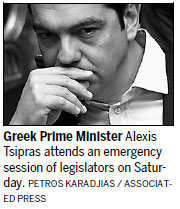European bank considers terms for financial 'haircut'
Premier's call for referendum opposing plan of creditors has left him with few friends in EU
European Central Bank policymakers are considering tightening Greek banks' use of an emergency funding lifeline but keeping backup options open, people familiar with the matter said.
A tightening would curb lenders' access to multibillion-euro central bank support that the lenders use to pay out deposits, making it harder for them to meet such demands.
"There is a possibility of an extension," said one of the people with direct knowledge of the telephone discussion among the ECB's decision-making Governing Council, adding that a bigger "haircut" is being discussed.
Such a step involves imposing a higher valuation discount on the security banks' offer for this funding to reflect the impact of a likely default by Greece on Tuesday on its debt to the International Monetary Fund.
If the haircut is more aggressive, it curbs banks' use of the Emergency Liquidity Assistance. But the calculation is not publicized, meaning it would not be clear how much such funding had been closed off.
The limit for funding is now roughly 89 billion euros ($99 billion), sources said, and has held steady at that level for a number of days amid growing protests from Germany.
Even before Greek Prime Minister Alexis Tsipras called a referendum for next Sunday on creditors' bailout demands, the head of Germany's Bundesbank had criticized the use of emergency credit.
Tsipras was torn between accepting harsh bailout terms and a rebellion by the left wing of his party as he decides to call a referendum to break the political deadlock.

No, not 2015 but 2011.
Four years ago, George Papandreou, fearing the loss of his socialist PASOK party's parliamentary majority, stunned his EU partners by announcing his intention to put austerity measures demanded by international creditors to a popular vote.
Back then, European leaders browbeat Papandreou into backtracking rather than stake the future of the single currency on the will of angry Greek voters. The prime minister reversed his decision and was swiftly toppled. No referendum was held.
Today, Prime Minister Alexis Tsipras has responded to similar circumstances with a similar proposal for a referendum. But this time around, with the eurozone in less jeopardy from contagion than it was four years ago, European leaders may be prepared to let Greeks vote and face the consequences.
In 2011, global financial markets were in turmoil with many doubting the survival of the euro single currency.
Reuters - AP
(China Daily 06/29/2015 page11)














